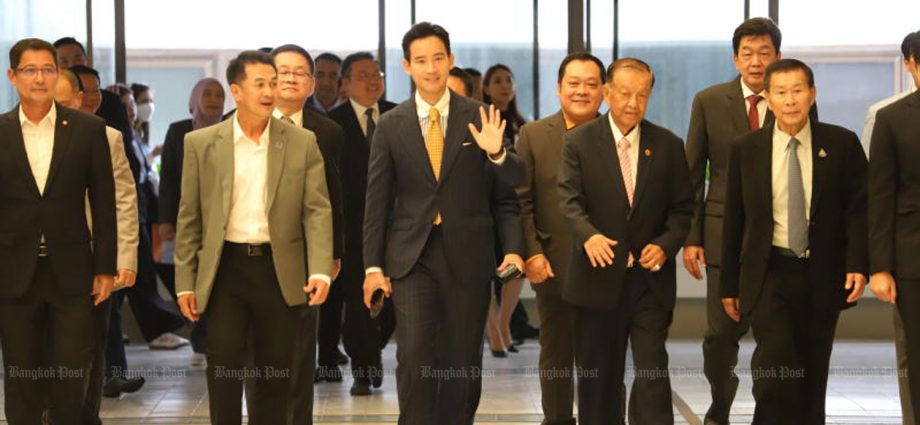
An alliance of eight political parties has agreed to bring forward their timeline for forming the new government by 2-3 weeks, and set up two more working groups.
Move Forward Party (MFP) leader Pita Limjaroenrat chaired a meeting of the eight allies at the Pheu Thai headquarters on Wednesday.
Leaders and representatives of all eight parties attended, the others being Pheu Thai leader Cholnan Srikaew, Prachachat Party leader Wan Muhammad Nor Matha, Thai Sang Thai Party deputy leader Anudit Nakornthap, Pheu Thai Ruam Phalang leader Wasawat Poungponsri, Seri Ruam Thai leader Pol Gen Sereepisuth Temeeyaves, Fair leader Pitipong Temcharoen and a Palang Sangkhom Mai representative.
After the meeting, Mr Pita said they welcomed the Election Commission’s move to speed up the endorsement of at least 95% of all MPs-elect. If the EC endorsed the poll results more quickly, leaders of all eight parties agreed the planned formation of the next government could be moved forward by 2-3 weeks, well ahead of schedule, the MFP leader said.
Earlier, EC chairman Ittiporn Ittiporn Boonpracong said he was confident poll results would be endorsed more quickly than they were in 2019, and well ahead of the mid-July deadline.
Under the law, the EC has 60 days from Election Day, or until July 13, to certify at least 95% of all MPs-elect, to make the results official. In 2019, it completed this task on May 8, or 45 days after polling day. This year, the 45-day mark would fall on June 28.
If the government could be formed faster, budget planning could also be moved up 2-3 weeks, the MFP leader said. The alliance would meet again on June 20 at Thai Sang Thai headquarters, he added.
The eight parties also agreed to set up two more working groups, on reform of fishing sector and to oversee the transition of fiscal budgets.
Once the government was formed, budgets could be allocated to address the problems affecting the people, Mr Pita said. (continues below)

Leaders and representatives from the eight colaition parties arrive at the Pheu Thai headquarters in Bangkok on Wednesday. (Photo: Varuth Hirunyatheb)
On the party’s campaign cartoon featuring a hammer and sickle, the MFP leader said it represented the party’s 100 list candidates who were from the labour and agricultural sectors. He insisted there was no hidden motive.
This was in response to the EC’s questioning of the party’s campaign cartoon after a complainant asked the commission to investigate if the party was against constitutional monarchy, which would be a violation of the constitution.
The hammer and sickle is used to represent industrial and agricultural workers, the proletariat, and is also used by the communist movement. The commission asked why the MFP used the hammer and sickle, and what it meant in the campaign cartoon.
Regarding the complaint about his ownership of shares in the now-defunct iTV media firm, Mr Pita said he was waiting to hear from the EC on this matter.
He stood firm that he was the manager of his late father’s estate. He had not received the 42,000 shares originally held by his father, who died in 2006.
On Tuesday, Mr Pita said he had transferred the 42,000 shares to relatives to ensure there was no barrier to him being the next prime minister, amid attempts to block him from entering government
Mr Pita wrote on Facebook on Tuesday morning that the Prime Minister’s Office terminated its contract with iTV on March 7, 2007, and iTV had not been a media organisation since then.
“But now there are attempts to revive iTV as a mass media organisation, to attack me,” Mr Pita wrote.
He said that in its 2018-2019 financial statement, iTV was defined as a holding company but in two following financial statements it was defined as a TV organisation.
Mr Pita said he did not know who was behind attempts to revive iTV. He had heard it could be for the business interests of its executives, and also that it might be politically motivated against him taking government.
He had to manage the risk. He reiterated his belief the iTV shares case would not affect the forming of the new government. The MFP won 151 seats in the May 14 general election, earning the right to be the core party in forming a coalition administration.
In 2007, iTV stopped broadcasting and its licence was taken over by Thai PBS. The company was delisted from the Stock Exchange of Thailand in 2014. Its company registration has been kept active because it is embroiled in a dispute with the government over unpaid concession fees.
The major shareholder of iTV was Intouch Holdings Co, with 638,602,846 shares. Intouch’s major shareholder is Gulf Energy Development Plc.

